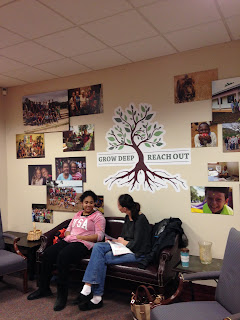Mentoring 101
Mentoring 101
- Why?
- Our Lent mentoring ministry exists to give kids one more adult/caring relationship in their lives that they can talk to, trust, and by whom to be guided in their faith journey. In the words of Hebrews 12:1, to add to kids’ “cloud of witnesses.”
- Mentoring is how we choose to be intentional about the more reflective season of Lent while maintaining our focus on relational ministry.
- Who?
- AAA adults!
- What?
- One-to-one mentoring conversations. These will focus on relationship-building and the Lenten series theme. You will be given a discussion guide each week. Conversation tips and best practices are below as well.
- This Lent our theme is “Metanoia”.
- Ash Wednesday will be a traditional service with an introduction to the theme and then we’ll spend the next five weeks hearing different stories relating to the theme.
- All mentors are mandatory reporters! If your mentee tells you something that you think is reportable (if they seem to be a danger to themself, or others, in danger of being harmed, etc.) you must report it to Brent. Err on the side of caution!
- Where?
- At Prince of Peace*.
- Check-in at the CLC before finding a place in the building to talk.
- No closed doors. Always visible to others.
- *Alternative meeting times/formats are allowed after a discussion with all parties and Brent*.
- When?
- Ash Wednesday, Mar. 2 – Wednesday, Apr. 6. 6:30-8:00pm (but usually done 7:30/7:45)
- We ask all mentors and mentees to meet on Wednesdays from 6:30-7:00 and then attend worship together/view worship (we livestream) at 7:00pm if at all possible. It's all part of the experience.
- Make-up sessions can be done Sunday mornings, Wednesdays before 6:30pm, or before Holy Week services (Maundy Thursday & Good Friday). Again, if meeting at other times or via online format, make sure Brent is on the same page.
Good Practices for Caring Conversations
Helpful tips & insights from the pros at peerministry.org
Asking questions:
+Goals
-Enhance personal interest in others’ stories, thoughts, values, & feelings.
-Ask caring & meaningful questions.
-Build connections through conversation.
+While you will always have a discussion guide to go off of, you are not bound to it!
-In your conversations, feel free to take conversation where you need it to go. The goal of mentoring is your relationship with your mentee, not covering every question on the guide.
-Using open-ended, personally engaging questions conveys caring & a willingness to want to get to know a person. If you want to talk about something but aren’t sure, just ask “Is it okay if I ask about _____?”
-What, How, & sometimes Why. These questions anticipate more information. Be careful with “Why” as sometimes people aren’t always sure why they feel or do something. Also, “Why” can sometimes lead to a person feeling attacked-depending on tone of voice or attitude in which it is asked.
Listening:
+Goal, “Entering another’s world.”
-Listening is the ability to be with another in her or his world, attempting to experience what she or he is feeling. It takes wanting to listen; being more interested in the other than in oneself; & putting aside for the moment one’s own concerns in order to concentrate on the other person.
+Turn off filters & break down barriers.
-Filters that can inhibit listening might be:
*bias toward certain people or groups
*knowledge/lack thereof about a topic or group
*personal values & beliefs
*likes & dislikes
*patience
*stress
-Nonverbal cues to check yourself on & watch for
*Eye contact
*Posture
*Checking phone/watch
+Clarify & Reflect
-Seek clarity when you aren’t sure what is trying to be said. Saying things like “Can you say more about that?” or “What do you mean by….?”
-Reflect what you’re hearing. Using phrases like, “so what I’m hearing you say is…” or “am I right in guessing that you feel…?”




Comments
Post a Comment